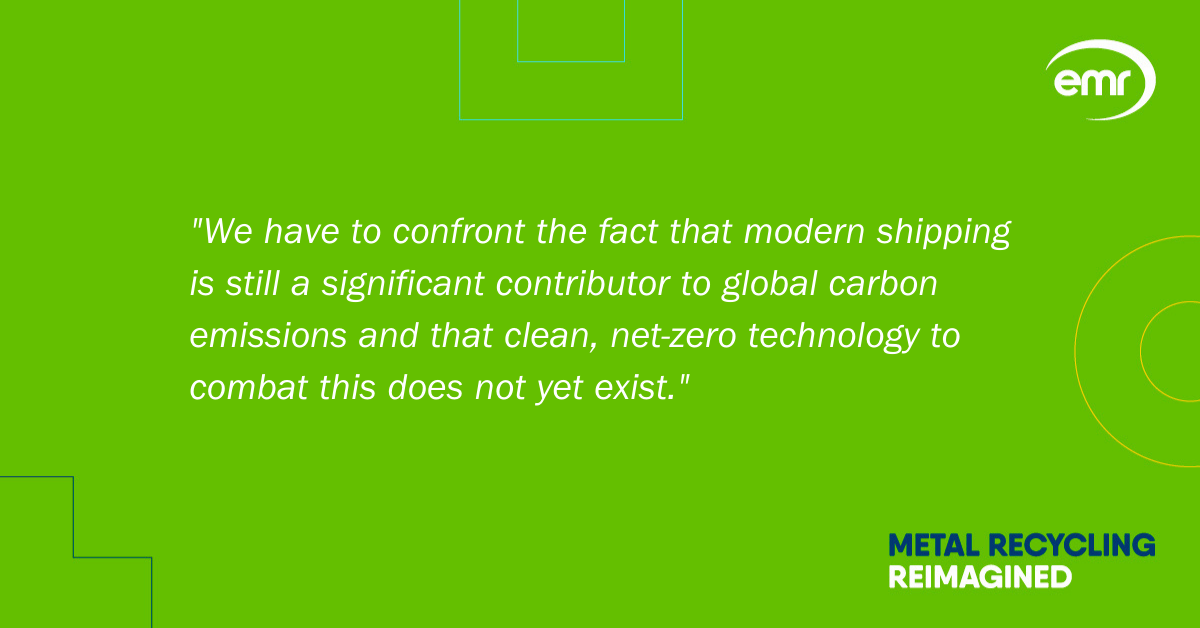CHOOSE
A DIFFERENT TERRITORY
When it comes to decarbonising our operations and hitting our target to be fully net zero by 2040, there is one part of our business that presents the biggest challenge of all - shipping.

As it stands, the UK economy simply doesn’t have the capacity to re-use and recycle the huge quantities of metal that EMR processes each year. For our products (from iron and steel to aluminium, copper and plastic) to play their vital role in replacing the use of virgin material in the next generation of infrastructure or consumer goods, EMR must ensure it reaches the right global markets.
And in recent years, this is an area in which we’ve made substantial investments. Because moving material on water is, per mile, more efficient than other modes of transport, EMR invested around $14 million to install a dockside for our Eastern division in Brayton Point, Massachusetts, so our operations could move materials on water by barge.
Yet, although transport on water by ship is much more efficient in terms of carbon impact than road haulage or even rail, we have to confront the fact that modern shipping is still a significant contributor to global carbon emissions.
Unfortunately, right now we cannot invest in clean, net-zero shipping technology for one simple reason: it’s doesn’t yet exist.
‘Our Decade of Action’ strategy (which highlights the first steps we will take over the next ten years on our route to become net-zero by 2040) was launched last year with an understanding that in some areas, such as shipping, it will take our transport partners time to explore and innovate different methods of propulsion so that shipping can become net-zero.
Despite these challenges, there’s a lot we can do now to reduce our carbon emissions from shipping. On one level this is about investing in modern, electrified equipment, such as hybrid cranes that ensure ship loading happens in a sustainable and efficient way. There are also a lot of incremental changes EMR can make today which will, when added together, provide a substantial reduction to the impact of our shipping operations.
On a more fundamental level, EMR is working closely with UK metal producers and heavy industry to increase the volume of recycled metal they can use within the UK, avoiding the need for material to be exported in the first place. This is a long-term goal but if EMR can deliver the right grade and purity of material that UK manufacturers require – and they are able to scale up their volumes to use more of our materials – there is an opportunity to create a circular economy much closer to home.
To make this happen, EMR is building closer supply chain relationships now. Projects such as RECOVAS – building a UK supply chain for the recycling and re-use of electric car batteries – is bringing together the UK’s biggest car manufacturers, academia and EMR, to put in place the foundations of a circular economy that keeps valuable battery materials within our shores. We are looking to develop the same sort of collaboration with the UK steel supply chain.
One of the benefits of being a privately-owned family business is that EMR can make long-term investments and this attribute is invaluable when it comes to the drive to make our business more sustainable.
Right now, we don’t have all the answers when it comes to decarbonising our shipping use. Yet, while the pace of innovation increases and solutions emerge, ‘Our Decade of Action’ strategy ensures we’re busy getting ready for a net-zero future, however it’s delivered.
Read about our sustainability commitments and our plan to be net-zero by 2040.